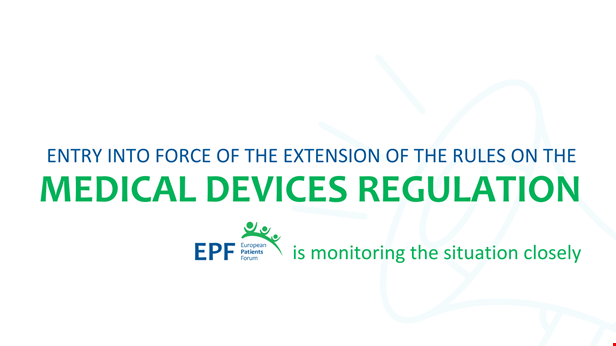EU to grant extra time for implementation MDR

The European Parliament and the Council of the European Union formally approved the extension of the rules on medical devices. The Regulation amendments were published in the Official Journal today. Read more.
EP and Council of the EU grant extra time for implementation of Medical Devices Regulation
The European Parliament and the Council of the European Union formally approved the extension of the rules on medical devices last Wednesday. Both institutions had already given their green light to the proposed amendments in recent weeks. Earlier this year, the Commission proposed the changes following reports of disruptions in the availability of many medical devices in the EU and repeated calls for action from stakeholders, including the European Patients’ Forum (EPF). The amendments to the Regulation were published today's Official Journal. Keep reading for the updates.
New deadlines
The amendments introduce new deadlines for compliance with the Medical Devices Regulation (MDR) depending on the risk class of medical devices. Originally, devices on the market had to comply with the MDR by 26 May 2024. Under the proposed amendment, the deadline for high-risk devices to comply with the new rules would be extended to the end of 2027 instead of May 2024, while medium and low-risk devices would have to meet the requirements by the end of 2028.
Mitigating the risk of shortages
The proposal aims to give Notified Bodies and manufacturers more time to certify medical devices, mitigating the risk of shortages. If a necessary medical device is not available when the patient needs it, life-threatening consequences may arise.
Having originally argued for a one-year delay, EPF hopes that the three-year delay and other changes adopted this week will be accompanied by measures tackling bottlenecks of access and thus ensuring a high level of readiness for the implementation of the MDR.
Key role for patient organisatons
Patient organisations have a key role to play in these changes. Member State authorities should engage in regular dialogue with their national patient organisations to ensure that information flows and any emerging patient concerns are addressed promptly by regulatory authorities.
Patient safety must remain the priority and patients should be encouraged to report any unexpected problems they may encounter with their devices.
This postponement should, among other things, be coupled with substantial investments by the Commission, the Member States, and the medical devices industry in the infrastructure for the implementation of the Regulation, such as increasing the capacity and number of accredited Notified Bodies.
EPF will continue to monitor the implementation of the MDR and to voice the concerns of the patient community.
